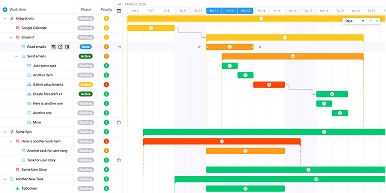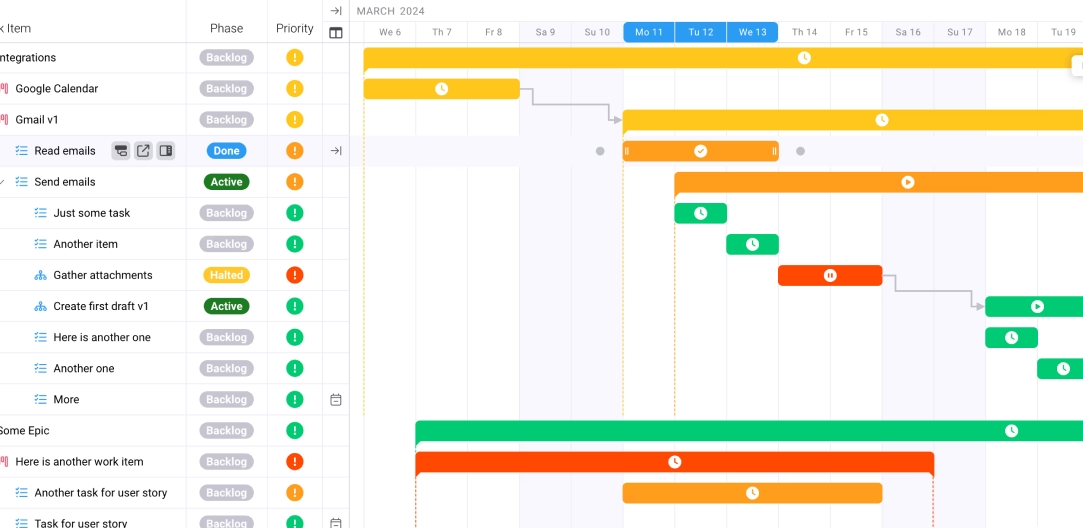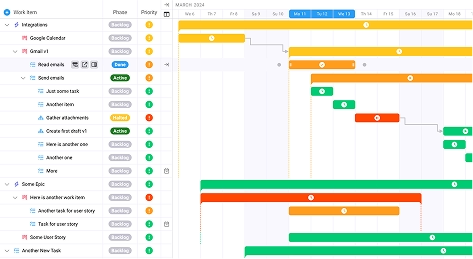
Project Management Best Practices Every Marketing Agency Director Must Implement
Key takeaways:
- Structured project management systems deliver measurable ROI: Organizations implementing project management best practices see 2.5x higher success rates and save 28 times more money than those without standardized approaches
- Technology integration is essential for scaling: Modern marketing agencies require integrated project management platforms that connect billing, resource planning, and clint communication to maximize efficiency
- Time tracking and resource allocation drive profitability: Agencies that master billable time allocation and resource optimization can increase productivity by up to 30% while maintaining service quality
- Client satisfaction depends on systematic delivery: Consistent project delivery through established frameworks builds the trust that generates 92% of consumer recommendations from satisfied clients
The harsh reality facing marketing agency directors today is this: 40% of agencies cite time management as their top internal challenge, yet most continue operating without robust project management frameworks. While the marketing agency industry worldwide is projected to grow at 4.5% compound annual growth rate in 2025, those without systematic project management best practices are being left behind. Project management best practices every marketing agency director must implement aren’t just operational necessities—they’re competitive advantages that separate thriving agencies from struggling ones.
The Current Challenge – What’s Broken in Marketing Agency Project Management
Marketing agencies operate in an increasingly complex ecosystem where traditional project management approaches fail to meet modern demands. The statistics paint a concerning picture: 69% of agency leaders agree on the importance of project and task management, yet many agencies still rely on fragmented systems that create more problems than they solve.
The core issues plaguing agency project management stem from three fundamental problems. First, most agencies lack standardized processes for handling client work, leading to inconsistent delivery quality and timeline management. Second, resource allocation remains largely reactive rather than strategic, causing team burnout and project delays. Third, communication breakdowns between teams, clients, and stakeholders create costly revisions and scope creep that erodes profitability.
These challenges compound in today’s environment where client expectations continue rising while agency margins face pressure. Without robust project management frameworks, agencies find themselves in a cycle of firefighting rather than strategic growth. The agencies that recognize this reality and implement comprehensive project management best practices position themselves for sustained success.
The Strategic Framework – A Systematic Approach to Agency Project Management
Successful marketing agencies don’t stumble into effective project management—they build it systematically through proven frameworks that address their unique operational needs. The foundation begins with recognizing that organizations that use project management practices have a 92% success rate in meeting project objectives, compared to significantly lower success rates for agencies operating without structured approaches.
The strategic framework for marketing agency project management encompasses five critical components that work together to create operational excellence. These components include standardized project initiation processes, integrated resource planning systems, real-time communication protocols, quality assurance checkpoints, and performance measurement mechanisms.
This systematic approach transforms how agencies operate by creating predictable workflows that clients can trust and team members can execute consistently. Rather than each project becoming a unique challenge requiring custom solutions, standardized frameworks allow agencies to leverage proven methodologies while maintaining the flexibility needed for creative work. The result is improved project delivery, enhanced client satisfaction, and increased team productivity.
Implementation Tactics – Five Essential Project Management Best Practices
1. Establish Integrated Project Management Platforms
The foundation of effective agency project management lies in selecting and implementing comprehensive platforms that unify all project-related activities. Modern agencies require solutions that combine project management capabilities with billing, CRM functionality, and time tracking features.
Research demonstrates that projects that implement project management best practices are 2.5 times more successful than those without structured approaches. The key lies in choosing platforms that provide real-time visibility into project status, resource allocation, and budget utilization while maintaining the flexibility creative teams require.
Successful implementation requires careful consideration of your agency’s specific workflows and client requirements. The platform should facilitate seamless collaboration between creative teams, account managers, and clients while providing the data visibility leadership needs for strategic decision-making. Integration capabilities with existing tools and scalability for future growth are essential considerations that prevent costly migrations later.
2. Implement Systematic Resource Planning and Allocation
Effective resource planning represents one of the most critical yet challenging aspects of agency project management. The data reveals that process optimization boosts productivity up to 30% when agencies implement strategic approaches to workforce allocation and project scheduling.
The systematic approach to resource planning begins with accurate skills assessment and capacity planning for all team members. This involves creating detailed profiles that capture not only technical capabilities but also working styles, availability patterns, and growth objectives. Advanced resource planning enables agencies to match the right talent to appropriate projects while maintaining balanced workloads across the team.
Smart resource allocation also incorporates predictive planning that accounts for typical project phases, revision cycles, and seasonal demand fluctuations. Agencies that master this approach can maintain consistent team utilization rates while avoiding the feast-or-famine cycles that plague many creative organizations. The result is improved project delivery timelines and enhanced team satisfaction through more manageable workloads.
3. Deploy Advanced Time Tracking and Billing Systems
Professional agencies recognize that precise time tracking forms the backbone of profitable operations and client transparency. The importance of systematic time tracking extends beyond simple billing accuracy—it provides the data foundation for improving project estimates, identifying process inefficiencies, and demonstrating value to clients through detailed reporting.
Implementing effective time tracking requires more than just software deployment; it demands cultural change that emphasizes accountability and accuracy. Team members need training on proper time categorization, project phase documentation, and the business rationale behind detailed tracking. When executed properly, comprehensive time tracking enables agencies to identify which activities generate the highest value and which processes require optimization.
The project management strategies and benefits for marketing teams clearly demonstrate how integrated time tracking supports both operational efficiency and client relationship management. Advanced systems provide automatic time capture, project-based categorization, and real-time budget monitoring that prevents cost overruns before they occur.
4. Create Standardized Client Communication Protocols
Consistent client communication represents a critical success factor that differentiates professional agencies from their competitors. Research shows that 92% of consumers trust recommendations from friends and family, making client satisfaction and advocacy essential for sustainable growth through referrals.
Effective communication protocols begin with structured project kickoff processes that establish clear expectations, timelines, and deliverable specifications. This includes implementing client portal systems that provide 24/7 access to project status, completed work, and upcoming milestones. Transparent communication builds trust and reduces the misunderstandings that lead to scope creep and project delays.
The systematic approach includes regular check-in schedules, standardized reporting formats, and clear escalation procedures for addressing concerns. Professional agencies also implement feedback collection mechanisms that capture client satisfaction data throughout the project lifecycle, enabling continuous improvement in service delivery. This proactive approach to communication management significantly improves client retention and satisfaction scores.
5. Establish Performance Measurement and Optimization Systems
Sustainable improvement requires systematic measurement of key performance indicators that drive agency success. The top 5 weekly KPIs for marketing project managers provide essential insights into operational efficiency, client satisfaction, and team productivity that enable data-driven decision making.
Comprehensive performance measurement encompasses project delivery metrics, financial performance indicators, client satisfaction scores, and team productivity measures. These metrics provide the feedback loops necessary for continuous improvement and strategic planning. Advanced agencies implement dashboard systems that provide real-time visibility into these critical indicators for leadership teams and project managers.
The optimization process involves regular review cycles that analyze performance trends, identify improvement opportunities, and implement systematic changes to enhance outcomes. This includes leveraging the 10 time-saving tips for marketing agency project managers to streamline operations and eliminate inefficiencies that drain profitability and team morale.
Measuring Success – KPIs and Metrics That Matter
Effective project management measurement requires tracking metrics that directly correlate with agency success and client satisfaction. The research demonstrates that organizations that invest in project management save 28 times as much money as those that don’t, making investment in proper measurement systems a clear business imperative.
Primary performance indicators include project completion rates, budget adherence percentages, and timeline accuracy metrics. These operational measures provide immediate feedback on project management effectiveness and highlight areas requiring attention. Secondary metrics encompass client satisfaction scores, team utilization rates, and profitability analysis by project type and client segment.
Advanced measurement systems also track leading indicators that predict future performance, such as pipeline health, resource capacity planning accuracy, and client engagement levels. The complete guide for managing project deliverables effectively emphasizes how systematic measurement enables proactive management rather than reactive firefighting.
Financial metrics deserve particular attention, including gross margins by project, client lifetime value calculations, and cost per acquisition analysis. These measurements enable agencies to identify their most profitable client segments and service offerings while optimizing pricing strategies for maximum sustainable growth.
Future Considerations – Emerging Trends and Technology Integration
The marketing agency landscape continues evolving rapidly, driven by technological advancement and changing client expectations. Forward-thinking agencies must prepare for increased automation, artificial intelligence integration, and evolving client service models that will reshape how project management operates in professional services organizations.
Artificial intelligence and automation technologies present significant opportunities for improving project management efficiency. Research indicates that companies that have adopted AI have seen a 5% increase in annual revenue and a 20% reduction in operational costs, suggesting substantial benefits for agencies that strategically implement these technologies.
Future project management systems will likely incorporate predictive analytics for resource planning, automated progress tracking, and intelligent client communication systems. Agencies that begin preparing for these technological shifts today will be better positioned to leverage competitive advantages as these tools become mainstream.
The evolution toward outcome-based pricing models and performance guarantees will also require more sophisticated project management approaches that can demonstrate measurable business impact for clients. This trend emphasizes the importance of implementing comprehensive measurement systems and client communication protocols that support value-based service delivery.
Marketing agency directors who implement comprehensive project management best practices position their organizations for sustained growth in an increasingly competitive marketplace. The data clearly demonstrates that organizations with standardized project management practices save more money than those that don’t, making systematic implementation a business imperative rather than operational luxury.
The journey toward project management excellence requires commitment, investment, and systematic execution across all operational areas. However, agencies that embrace these project management best practices every marketing agency director must implement will discover improved profitability, enhanced client satisfaction, and sustainable competitive advantages that compound over time.
Success in modern marketing agency management demands more than creative talent—it requires operational excellence that enables creative teams to focus on delivering exceptional client results while leadership maintains strategic oversight of business performance and growth objectives.
Frequently Asked Questions
What are the most important project management tools for marketing agencies?
Marketing agencies benefit most from integrated platforms, such as Ravetree, that combine project management, time tracking, billing, and client communication in unified systems. Essential features include resource planning capabilities, real-time collaboration tools, and comprehensive reporting dashboards that provide visibility into project status and team productivity.
How can marketing agencies improve their project delivery timelines?
Improving project delivery requires implementing standardized processes, accurate resource planning, and proactive communication systems. Agencies should establish clear project phases, realistic timeline estimates based on historical data, and regular checkpoint reviews that identify potential delays before they impact final delivery dates.
What metrics should marketing agencies track for project management success?
Key metrics include project completion rates, budget adherence percentages, client satisfaction scores, and team utilization rates. Advanced agencies also monitor leading indicators such as pipeline health, resource capacity accuracy, and profitability analysis by client segment and project type.
How does effective project management impact client retention?
Systematic project management directly improves client retention through consistent delivery quality, transparent communication, and predictable outcomes. Clients who experience reliable project delivery and clear communication are significantly more likely to provide referrals and expand their engagement with the agency.
What role does technology play in modern marketing agency project management?
Technology serves as the foundation for scalable project management, enabling automation of routine tasks, real-time collaboration, and data-driven decision making. Modern agencies require integrated platforms that support workflow optimization, resource planning, and performance measurement across all operational areas.
How can small marketing agencies implement enterprise-level project management practices?
Small agencies can implement sophisticated project management through cloud-based platforms that provide enterprise functionality without requiring significant upfront investment. The key lies in selecting scalable solutions that grow with the agency while maintaining simplicity for initial implementation and team adoption.









